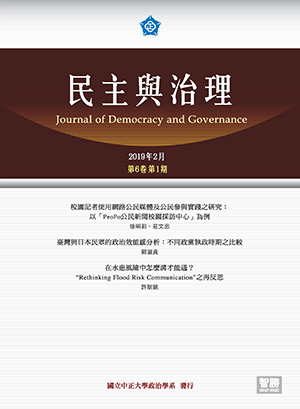Hot News
| 中文篇名 |
臺灣與日本民眾的政治效能感分析:不同政黨執政時期之比較 | |
|---|---|---|
| 英文篇名 |
An Analysis of the Political Efficacy between Taiwanese and Japanese: Comparison of Different Political Parties in Power | |
| 作者 | ||
| 中文摘要 |
民眾政治效能感是民主國家體制運作正當性的關鍵源頭。日本與臺灣係東亞自由民主程度較高的國家,均經歷政黨輪替,而在政黨輪替帶來民主深化的同時,民眾政治效能感是否隨之提高?又哪些因素影響臺灣與日本民眾的政治效能感,是值得關注的議題。過去文獻發現,政治賦權可用來解釋政治效能感,認同執政黨的民眾通常政治效能感較高,故本研究基於政治賦權理論,探究政黨認同對政治效能感的影響,同時佐以其他可能因素,包括教育程度、性別及年齡以進行分析。 | |
| 英文摘要 |
People’s sense of political efficacy is the key source of the legitimacy of the government in democratic countries. In East Asia, Japan and Taiwan are countries with a high degree of freedom and democracy. They have both experienced the party alternation. Does the political efficiency of the people increase simultaneously when party alternation brings about the deepening of democracy? What are the factors having impact on the sense of political efficacy of the Taiwanese and Japanese people is a topic worthy to study. From the finding of past literature, political empowerment can be used to explain the sense of political efficacy. The people who endorse the ruling party usually have a higher sense of political efficacy. Therefore, this paper will study the effect of party identification on political efficacy based on the theory of political empowerment, at the same time analyze other explanatory factors including education, gender and age. | |
| 關鍵詞 |
政治效能感、政治賦權、政黨輪替、sense of political efficacy、political empowerment、party alternation | |
| 刊名 | ||
| 期數 | ||
| 起訖頁 |
033-060 | |
| 出版單位 |
國立中正大學政治學系 | |
| DOI | ||
| QRCode |
| |
| 上一篇 | ||
| 下一篇 |



